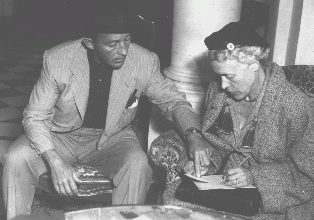Page 78
[Begin Tape 1, Side A]
Biagi: Let me ask you kind of a general question first. We're going to get to Tokyo Rose and everything, because that's where we left off. I was thinking last night, I really don't know how you worked, how you wrote, how you thought about writing and what writing meant to you.
Beebe: You worked wherever you could, and you learned to do it. I often composed leads in the bathroom. It was the only place you could have privacy, you see, especially if I had to dictate. [Laughter.]
Biagi: That's wonderful. That's honest.
Beebe: Well, it was a place, especially when you were on the hoof, you see, you could only get away from the others and get your thoughts together rather quickly some place private. There's always that. [Laughter.] I never liked dictation. When I was working a beat, I'd sometimes have to. The office was so busy and they said, "At least, half dictate it." I remember one awful day I dictated 18 stories from that beat, and I think the next week or two, some big executive came out from New York. Periodically they would pep everything up, they came and got examples of things that could be improved. He was reading some of these stories. I found that when you dictate, you reach for the cliche, because you have to keep going and you just don't have time to write it short. [So I said] "Sorry, I didn't have time to write it shorter." So I stood there and stood it for a while, and I said, "Excuse me, but about four of those things are mine. That's the day in which I had to dictate 18 stories from the beat."
We got the stuff covered, and often there were requests from papers, you know. Some paper wanted to know how the irrigation or a bridge or something up in Montana was, and you had to do it. You had to get them what they wanted, and they didn't care too much that it was a sparkling piece of literature. They wanted the facts. But I always thought that [with] dictated stories, even when our big shots came from Washington for the United Nations in San Francisco, they would make this lovely fluent dictation a column long, without very much substance to it, because it was speculation and there wasn't very much fact. I always thought that you could improve any story by not dictating it.
Biagi: Did you see yourself as being a strong reporter or a strong writer, or both?
Beebe: Well, I think I was regarded as a good writer, but that, you see, is where the Star and the Tribune were so different. The Star always wanted you to do your own writing. They did very little rewrites. They figured that go-between, that's another way to make mistakes and get the wrong impression. So I liked assembling the facts. I always struggled with writing. I always felt good when it was done. The idea of coming in, you had so much, especially after, in the Associated Press, when everything had to be pretty concise, sometimes the pressure was good. I remember coming in one time with a story, it was quite complicated and it was fairly important. I was expecting to have time to write it for the night cycle's round, I don't know, 1:00 o'clock, 1:00 p.m. As I sat down, the East desk editor came over and said, "Look, could you just give us this much [six inches] for the P.M?" [Laughter.] I said, "Sure." Of course, knowing I had to do just that much, it took shape and I could do it. It really helped me. Then I went back and agonized over the night story, trying to get the rest of it all in.

